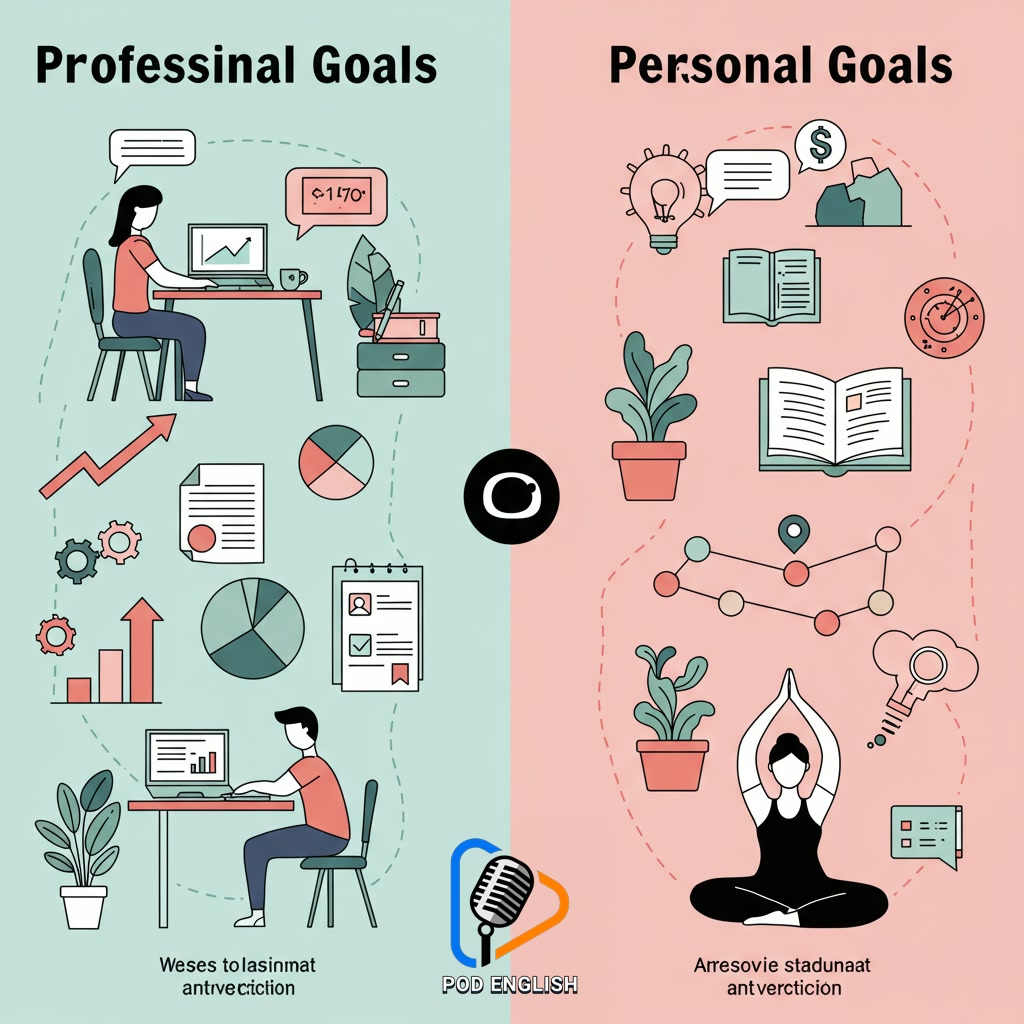Learn English
Learn English: How to Confidently Describe Your Personal and Professional Goals

This content focuses on helping individuals learn English effectively by providing strategies to articulate their personal and professional aspirations with confidence. It guides learners through expressing future plans and career objectives clearly and persuasively. The aim is to enhance English communication skills specifically for discussing ambitions and development.
Table of Contents
- Section 1: Why Learning to Describe Goals in English is Essential
- Section 2: Understanding Your Goals: Personal vs. Professional
- Section 3: Key English Vocabulary and Phrases for Discussing Aspirations
- Section 4: Structuring Your English Description of Goals
- Section 5: Building Confidence: Practice and Fluency Tips
- Section 6: Common Mistakes to Avoid When Talking About Goals in English
Section 1: Why Learning to Describe Goals in English is Essential
Learning to describe your personal and professional goals in English is a truly essential skill for anyone mastering the language. It goes beyond basic conversation, enabling you to articulate your future aspirations, career plans, and personal development objectives clearly and confidently. In today’s globalized world, being able to express your ambitions in English is crucial for job interviews, networking opportunities, academic pursuits, and even building meaningful connections with people from diverse backgrounds. This ability not only helps others understand your vision but also solidifies your own understanding of what you want to achieve, empowering you to navigate opportunities and challenges effectively as you continue to learn English and grow.

Why Learning to Describe Goals in English is Essential
Section 2: Understanding Your Goals: Personal vs. Professional
Following on from the importance of articulating goals, it’s crucial to understand that goals typically fall into two main categories: personal and professional. Personal goals relate to your life outside of work or career, focusing on self-improvement, hobbies, relationships, health, or experiences you want to have. Think about learning a new language (like English!), running a marathon, or spending more time with family. Professional goals, on the other hand, are centered around your career, job, or business. These might include getting a promotion, learning a specific work skill, increasing your salary, starting a new project, or even changing careers. Clearly distinguishing between these two types of goals is the first step in confidently describing them in English, as the language and vocabulary you use might differ slightly depending on whether you’re talking about your career ambitions or your personal development.

Understanding Your Goals: Personal vs. Professional
Section 3: Key English Vocabulary and Phrases for Discussing Aspirations
Building on the understanding of personal and professional goals, mastering specific English vocabulary and phrases is essential for articulating them clearly and confidently. Words like “aspire,” “aim,” “pursue,” and “achieve” are fundamental when discussing future plans and ambitions. You can talk about “setting a goal,” “working towards an objective,” or “developing a skill.” Phrases such as “My long-term goal is to…” or “I’m aiming to improve my skills in…” provide structure to your statements. Understanding terms like “career path,” “professional development,” “personal growth,” and “milestone” allows for more precise communication about your journey and progress. Using this targeted language helps you express your aspirations more effectively, whether in a job interview, a networking event, or a casual conversation about your future.

Key English Vocabulary and Phrases for Discussing Aspirations
Section 4: Structuring Your English Description of Goals
Building on your enhanced vocabulary, the next crucial step in confidently describing your goals in English is learning how to structure your message effectively. Simply listing aspirations isn’t enough; organizing your thoughts allows for clear and persuasive communication. Start by stating your goal directly, using phrases like ‘My primary professional goal is…’ or ‘Personally, I aim to…’. Follow this by explaining the ‘why’ – the motivation or importance behind your goal. Then, articulate the ‘how’ – the specific steps or actions you plan to take to achieve it. Conclude by briefly mentioning the desired outcome or timeline. This structured approach ensures your listener or reader easily understands your ambition, your plan, and your commitment, making your description both confident and impactful.

Structuring Your English Description of Goals
Section 5: Building Confidence: Practice and Fluency Tips
Building confidence and achieving fluency in describing your goals requires consistent practice. Don’t be afraid to speak out loud, even if it’s just to yourself. Try recording your voice to hear how you sound and identify areas for improvement. Engage in conversations with native speakers or fellow learners, focusing on expressing your aspirations. Utilize language exchange partners or online communities for real-world practice. Pay attention to intonation and rhythm as much as vocabulary and grammar. Start with simple sentences and gradually build up to more complex descriptions. Remember, fluency isn’t about speaking perfectly, but about communicating effectively and comfortably. Regular, focused practice is key to feeling confident when discussing your future plans.

Building Confidence: Practice and Fluency Tips
Section 6: Common Mistakes to Avoid When Talking About Goals in English
While consistent practice is vital for building confidence, it’s equally important to be aware of common mistakes when articulating your goals in English. A frequent error is using incorrect verb tenses; ensure you are using appropriate future forms like ‘I will,’ ‘I am going to,’ or the present continuous for planned events. Another pitfall is being too vague; try to employ specific vocabulary relevant to your field or aspirations instead of general terms. Avoid translating directly from your native language, as this often leads to unnatural or awkward phrasing. Lastly, don’t let the fear of making errors cause you to hesitate or speak unclearly. Focus on conveying your message with confidence and specificity, even if you make minor grammatical slips. Recognizing and working on these common issues will significantly improve your ability to discuss your goals effectively.

Common Mistakes to Avoid When Talking About Goals in English













